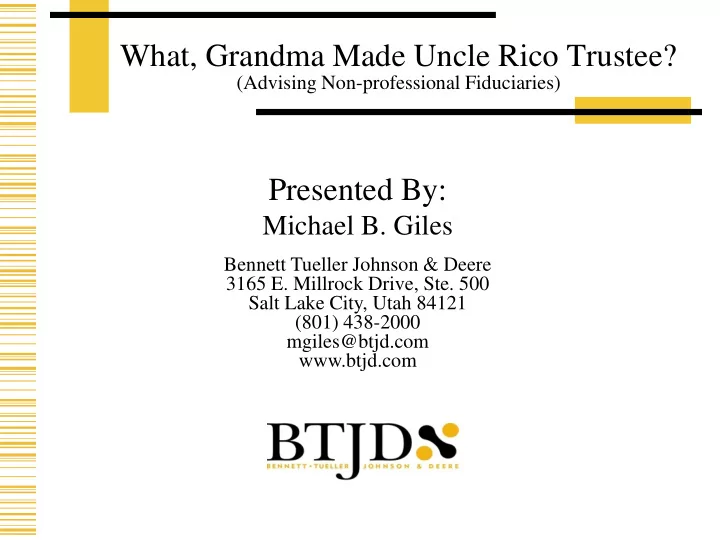

What, Grandma Made Uncle Rico Trustee? (Advising Non-professional Fiduciaries) Presented By: Michael B. Giles Bennett Tueller Johnson & Deere 3165 E. Millrock Drive, Ste. 500 Salt Lake City, Utah 84121 (801) 438-2000 mgiles@btjd.com www.btjd.com
WAR STORIES
What is a Fiduciary? A fiduciary is a person who holds a legal or ethical relationship of trust with one or more other parties. Typically, a fiduciary prudently takes care of money or other assets for another person.
Who is a Fiduciary? Utah Code §75-1-201(16) – “Fiduciary” includes Personal Representative Guardian Conservator Trustee Who else? UTMA Custodians, attorney-in-fact, health care agent
Non-professional Fiduciaries There are many personality types and individual circumstances that make a person who they are. To quote Forrest Gump: “You never know what you’re gonna get.”
Non-professional Fiduciaries Frank and Francine Oldest Siblings who expect to be “in charge” and believe that they have been given the power by Mom and Dad to control the estate. Birthright Surprised to find out that that there are fiduciary duties and rules they must follow in the documents. May not come back after the first meeting.
Ethical Considerations Competent Know who you represent ! Read and understand the documents. If you don’t know, ask someone who does. Understand and track deadlines Know what the Prudent Investor Rule is, if it applies, and what it requires. Know what the Uniform Principal and Income Act is, if it applies, and what it requires.
Ethical Considerations Attentive Depending on the type of client, this will be a major or minor part of the engagement. Use docketing system to track deadlines and other important dates. Example: A Trustee has obligations to provide a copy of the relevant parts of the trust, provide notice regarding the irrevocable nature of a trust, provide notices to creditors, file ESBT and other tax elections; obtain tax ID numbers, provide asset information to the Personal Representative (for estate tax purposes), provide annual accountings and reports; and make final distributions.
Ethical Considerations Have the hard conversations early “People change when money is involved.” “Don’t be a victim of circumstance.” “This is work.” Collaborate with them, listen to their ideas. Tell them “No.”
Build A Team You don’t know what you don’t know. Possible team members: Attorney (different practice areas) CPA CFP/Advisor Insurance Agents Medical Professionals/Experts Care providers
Protect Their Interests and Reduce Exposure to Liability Tell them the consequences of a breach. Recommend E&O if it is appropriate. Keep beneficiaries informed. Use receipts and releases. Take advantage of statutes Notice to creditors, notices regarding proposed distribution, annual accountings, petitions for instruction (seek the court’s blessing), and close it out.
Protect Their Interests and Reduce Exposure to Liability USE A CHECKLIST
Traps for the Unwary Trust Protectors (fiduciary, or not?) Tax Returns If you close an estate before the final tax return is filed, reserve some money to pay. Avoid Conflicts of Interest Who do you represent and in what capacity? Diminished Capacity.
Finally . . . . WAR STORIES
The End THANK YOU!!!
Recommend
More recommend